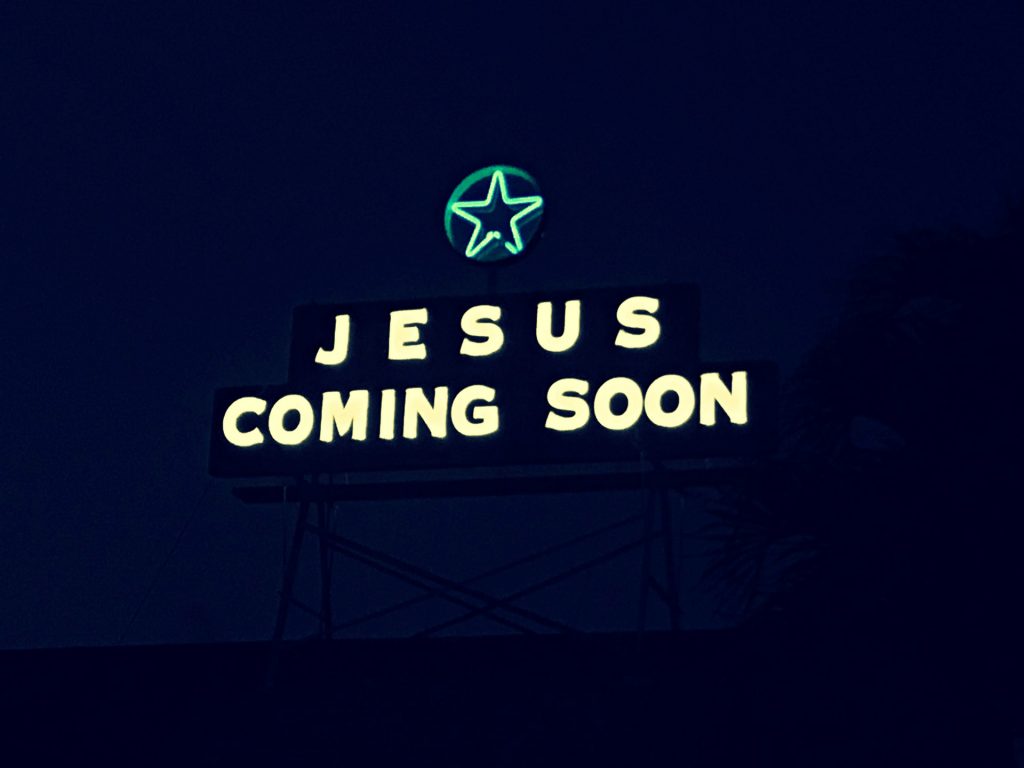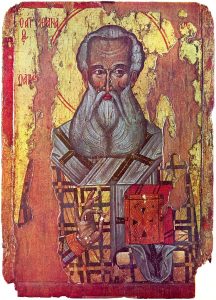
Hey, this Sunday is the beginning of Advent!
If you take your cues from the general culture you might think we were well into Christmas. The stores have been selling decorations and playing Christmas music since the day after Halloween.
But the church doesn’t begin the 12 days of Christmas until December 25. The four Sundays of Advent are all about getting ready for a Christmas that is still in the future.
And really, when you think about the world-changing importance of Christmas, we do well to take the time to get ready. After age upon age of speaking to us from afar, at Christmas God comes among us, born in human flesh.
That fact in itself is at the heart of salvation message. Not just that the message Jesus speaks is authoritative, but the fact that God came in person at all.

As St. Athanasius portrayed it so well in the 4th century, the incarnation embodies the solution to our great problem. Ever since Eden, the image of God has been damaged in each of us and in humanity as a whole. Sin turned us from our journey toward God and Life, aiming us instead for death and destruction — we all die, and the grave reduces us to our elemental dust.
Athanasius portrays us as the damaged painting of God’s image. How will the beauty of God’s precious creation be restored? Jesus, who IS the image of God, comes among us, and the Father takes him as the model to repaint us IN his image. Our broken nature is repaired. Instead of leaving us lost, Jesus reorients us so we can make our way back to God. So Jesus coming IS our salvation — all in advance of his death on the cross or his resurrection at Easter.
(If you want some Advent reading, try Athanasius’ great work On the Incarnation of the Word. Here’s an affiliate link to get it on Amazon.)
Matthew 24:36-44
So always, when Advent comes, the Lectionary doesn’t jump to Bethlehem. We get a long ramp-up: We expect Mary to be going into labor, but instead Advent 1 starts where we are — here in the 21st century, wondering how long, O Lord, will the craziness go on? When will Jesus come again — at the end of the age.
It takes effort for us to turn our attention to the true significance of Christmas.
Moving from our present struggles to the babe in the manger is like a carpenter taking a stiff straight piece of wood and bending it into the curving base for a rocking chair. That change takes heat, humidity, pressure, and time. It will take both effort and patience to bend our attention to the importance of Jesus coming as a child. So we start the journey to Bethlehem by tending to our longing for salvation here, now.
(Actually we were in the same scene just two weeks ago, but we’ve switched from Luke’s version to Matthew’s as “Year A” of the lectionary begins.)
The Bit We Like
This little passage has a good dose of the kind of tantalizing end-times prediction that Christians love to glom onto.
Then two will be in the field;
one will be taken
and one will be left.
Two women will be grinding meal together;
one will be taken
and one will be left.” (Matthew 24:40-41 NRSV)
Often Christians focus on this bit and talk of “the rapture.” Too often we use it to scare people into conversion with fears of being “left behind.” To wit, listen the 1969 recording of early Christian Rocker Larry Norman singing “I Wish We’d All Been Ready” (with unrelated grainy background video of Norman in action.)
Personally I think part of the draw is that the scary stuff lets us be the insiders. We are the ones who know, the ones who choose to follow Jesus, the ones who are safe. When life so often points out our powerlessness, our lack of necessary knowledge, all in the midst of looming danger, it helps to be an insider in the Big Picture things. It’s strangely comforting.
However, the risk of being an insider is we find ourselves almost inexorably drawn to matching up the predictions with the headlines. We assume that being truly ready means figuring out exactly when Jesus is coming.
The Bit We Miss
Better, though to read this evocative image in context. If we don’t, we miss the points Jesus was trying to make.
Jesus did include the scary image of being either taken or left, but he adamantly emphasized something else: we are not intended to know when he’s coming.
Why do I say this was more emphatic? Because he made the point repeatedly, in different words:
But about that day and hour no one knows,
neither the angels of heaven, nor the Son,
but only the Father.” (Matthew 24:36 NRSV)
You know the old expression, “God only knows”? Well when it comes to the second coming of Christ, God only knows.
Seems clear enough. We shouldn’t think we can put the puzzle pieces together because even Jesus doesn’t know when he will be back.
Still don’t believe him?
For as in those days before the flood …
they knew nothing until the flood came and swept them all away,
so too will be the coming of the Son of Man.” (Matthew 24:38-39 NRSV)
There’s his historical precedent: In the story of Noah, the great flood surprised everybody but Noah. And that’s the way it’s gonna be again, he says.
Still don’t believe him?
Then comes the scary stuff about being left or taken. But look at the point he drew from that:
for you do not know on what day your Lord is coming.” (Luke 24:42 NRSV)
Still not convinced?
Check out the little parable about the owner of the house who didn’t know when the thief would rob him, and it’s final point:
for the Son of Man is coming at an unexpected hour.” (Luke 24:44 NRSV)
So if you find yourself tempted to sort out the mysterious apocalyptic images to get a clear sense of when Jesus is coming, take note of this passage:
Jesus points out that
- people in Noah’s time didn’t know,
- you and I don’t know,
- the angels don’t know,
- Jesus himself doesn’t know,
- and the one thing we all do know is that it’s gonna be a surprise.
Give it up. Okay?
The Other Bit We Were Supposed to Pay Attention To
So what are we supposed to be doing in the meanwhile? That’s the bit we are supposed to be paying attention to here.
After the story of being taken or left, because we don’t know when he’s coming he tells us
Keep awake therefore” (Matthew 24:42)
And again, after the parable of the homeowner who didn’t know when he’d be robbed, he tells us
you also must be ready” (Matthew 24:44)
Too often we succumb to the false idea that being ready means being obsessed: it supercharges many Christians’ desire to predict the Lord’s coming.
But the goal is to stay alert, awake, ready.
Keep Awake. Be Ready.
But what does that mean, practically? We should think of ourselves like the servants on the country estate of a rich noble family in an old English novel.
The Family lives elsewhere, at their main house. But they come traveling from time to time — and they don’t always send word of their plans.
Some of their servants stay at the country estate to keep it clean and in good repair, to protect it from vandals, to tend the grounds and gardens. They are supposed to keep it ready for the owners.
Then, whether the family arrives in the morning or the evening, on any day of the year, the servants are ready.
They don’t have to get obsessed. They just have to do their jobs.
So that’s my Advent 1 message to you from this text: Don’t try to predict when he’s coming. Instead, do what you need to do to remain awake and ready for your Lord’s return.
Keep awake and alert and growing in your spiritual life by renewing your practices of prayer and engagement with Scripture.
Keep awake and alert in your Christian community by finding ways to connect and grow in relationship.
Keep awake and alert, participating in your Lord’s work, reaching out and caring for those in need — whether they need to hear the gospel or to be welcomed to a meal.
++++++++++++
A great way to make Advent a time of being awake and ready would be to join my online course on classic lectio divina. Learn a way to prayerfully engage with Scripture that Christians have practiced for at least 1500 years. We’ll explore the classic form of the practice, journeying together through four great Advent texts from Luke.
Last chance to check it out! Registration closes Sunday December 1st at Midnight.

Leave a Reply